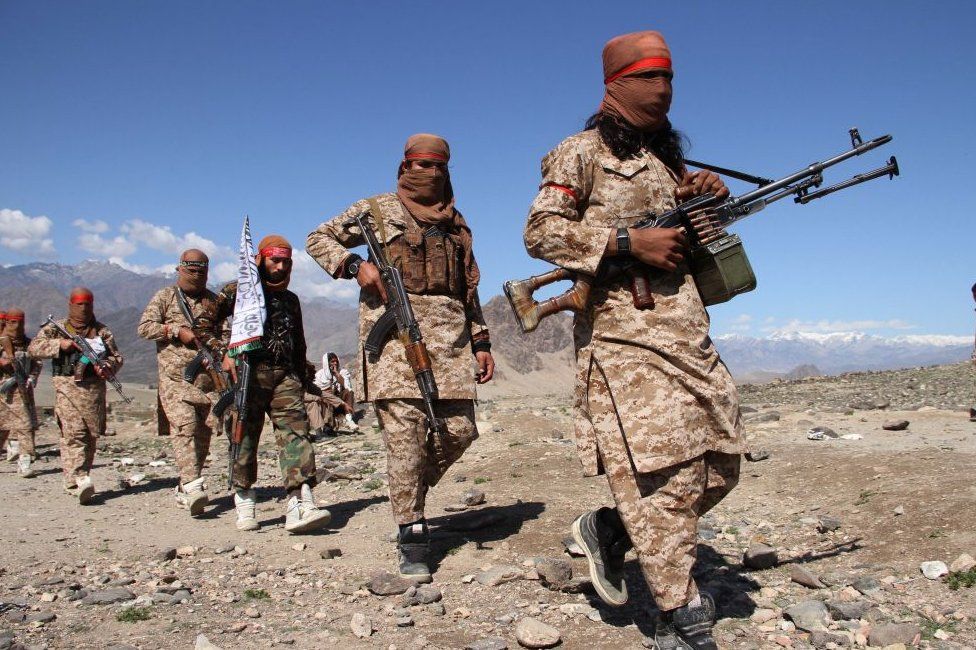The Afghan Taliban declared a public holiday to commemorate the second anniversary of their return to power and to honor their seizure of Kabul and the implementation of what they called an “Islamic system” of national security.
“On the second anniversary of the conquest of Kabul, we would like to congratulate the mujahid [holy warrior] nation of Afghanistan and ask them to thank Almighty Allah for this great victory,” the Taliban’s spokesman, Zabihullah Mujahid, said in a statement on Tuesday.
The country’s complete security is now guaranteed, a single authority governs its entire area, an Islamic system is in place, and everything is explained from the perspective of Sharia (Islamic law), according to Mujahid.
Soldiers increased checks, and security was tight on Tuesday in the capital, Kabul.
Their convoys gathered close to the demolished US embassy in Massoud Square. While songs played and boys sold the movement’s white flag bearing the Islamic confession of faith, some men brandished their weapons while others took photographs.
“Death to the Europeans, death to the Westerners, long live the Islamic Emirate of Afghanistan, death to the Americans,” screamed a gathering of Taliban supporters in the western city of Herat.
The Afghan Taliban declared a public holiday to commemorate the second anniversary of their return.
In Kandahar, the Taliban movement’s birthplace, where their reclusive supreme leader Hibatullah Akhunzada exercises absolute power, a military parade was canceled. According to provincial officials, Akhunzada canceled the procession to avoid upsetting the populace.
Still, no nation has formally acknowledged their rule. The international community still debates whether and how to interact with the Taliban leadership.
On August 15, 2021, when US-backed president Ashraf Ghani left and the Afghan security forces, established with years of Western support, crumbled, the Taliban captured the city following a quick onslaught as US-led foreign forces were departing after 20 years of fruitless war.
Although the United Nations reports scores of attacks on civilians, some of which the armed group ISIL (ISIS) has claimed responsibility for, Afghanistan is currently experiencing a state of peace not seen in decades.
The Taliban, which claims to uphold human rights by its interpretation of Islamic law, has also prohibited most Afghan women from working for humanitarian organizations, shut down beauty parlors, prohibited women from entering parks, and restricted their ability to travel when no male guardian is present.
The Afghan Taliban declared a public holiday to commemorate the second anniversary of their return.
Since the organization retook power, girls beyond 12 have been largely barred from attending classes. The ban is a significant barrier for many Western governments trying to formally recognize the Taliban authority.
Nevertheless, most Muslim-dominated nations and Islamic scholars reject the Taliban’s position on women’s rights. Some Taliban commanders support women’s education, with one senior leader asserting that Islam gives women the right to education and employment.
The organization expects progress to lead to international recognition, the easing of sanctions, and the return of almost $7 billion in central bank assets that were frozen at the US Federal Reserve Bank of New York in 2021 when the Taliban took control and were later split in half and transferred to a Swiss trust.
The UN special representative claims that corruption has decreased after it exploded for years after the Taliban were overthrown in 2001 as Western funding flowed in.
The Afghan Taliban declared a public holiday to commemorate the second anniversary of their return.
Additionally, there are indications that their ban on drug cultivation has significantly decreased poppy production in what was once the world’s largest opium producer.
However, a group of UN experts criticized their promises of a milder rule than during its first term in power from 1996 to 2001 on Monday.
The experts said in a statement that “despite assurances from the Taliban de facto authorities that any restrictions, particularly in terms of access to education, would be temporary, the facts on the ground have demonstrated an accelerated, systematic, and all-encompassing system of segregation, marginalization, and persecution.”
The de facto Afghan government’s words and actions have been increasingly at odds, and the notion of a “reformed” Taliban has been disproved, they continued.
SOURCE – (AJ)














